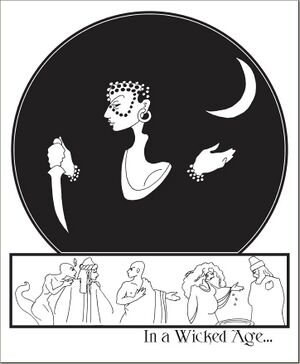In a Wicked Age

In A Wicked Age is a narrativist RPG by Vincent Baker.
System
Basics
Characters have six attributes:
- For Myself
- For Others
- With Love
- With Violence
- Covertly, and
- Directly.
Each attribute is represented by a die, as an example, one character may have a d12 for "For Myself".
Conflicts are resolved by picking two attributes, and rolling them for each character. The character with the highest single die roll wins the initiative, declares what he's doing and who (of the players who rolled for initiative) must 'answer' (i.e. roll against) him.
The answering character then rolls against the first score. If the answering character rolls twice the initiators score or more, the initiator is eliminated; if the answering character rolls half or less then they are eliminated. Otherwise, whoever rolls a higher total gains the advantage. Advantage is 1d6 added to your highest die for the next round.
Initiative then passes to anyone remaining who didn't either make a roll or answer one. This completes a round of conflict.
On the third round of conflict the high rolling character eliminates the lower. There is no fourth round.
The winner(s) narrate the results of the conflict, and may inflict either injury or exhaustion on the losers, reducing their dice. They can also inflict any effect they can negotiate with the loser instead of injury of exhaustion—for instance, being disarmed, or seduced.
A player character who lasts at least one round against a character with larger dice has his name added to the "We Owe" list. If you choose to delete your character's name from this list, you gain an advantage die, or may bring the same character into a later adventure. The "We Owe" list serves as a form of experience points, as well as determining the character's relative importance to the story. It encourages a "heroic" mindset of taking on difficult challenges.
Story Generation
In a Wicked Age is unusual in that it actively discourages preparation of any material before the game. At the beginning of each session basic elements of the story are suggested by drawing cards and consulting the Oracle table. There are four Oracles in the book:
- Blood and Sex
- God Kings of War
- The Unquiet Past
- A Nest of Vipers
Each includes plot elements in keeping with its theme. The players draw four elements from the Oracle, producing a seed for the plot which looks like this:
In a wicked age...
...A company of desert horsemen, hiding a woman amongst them...
...A wandering spirit, visible at will, an inflamer of human passions...
...The marriage of a region’s most beautiful girl, necessarily virgin and without blemish, to the dead stone effigy of a harvest god...
...A wandering exorcist, severe, who accepts no payment for his services but who lusts after carnal congress...
Character Generation
At this point players write down all of the characters named or implied by the story elements. For instance:
- The woman
- The harvest god
- The leader of the desert horsemen
- The virgin
- The exorcist
- The spirit
- The local boy in love with the virgin
They may also add any character they feel like to the list, although presumably adding 'Mickey Mouse' is frowned upon. After beating the shit out of the guy who isn't taking it seriously, play continues with each player selecting a character from the list and describing them.
In the example, the player of the virgin decided that she was also the woman being hidden by the desert horsemen, being escorted to her wedding. Once all the players have chosen a character, the GM gets the rest.
Character stats are generated quickly by assigning dice from a standard array to the six attributes (or three for NPCs). Finally each character must be given one, and preferably two, 'Best Interests'. These are goals that will bring the character into conflict with others. PCs are often competing, and NPCs are nearly always out to screw over one or more PCs. The GM determines all NPC goals while the players invent goals for their characters. There is no mechanical benefit to actually completing your goal, so goals need not be achievable.
Gameplay
PCs narrate everything about their character, the GM narrates everything else and frames scenes. Play continues in a freeform manner until a conflict arises, at which point the conflict resolution mechanics are used. The story is normally completed by the end of the session.
The next session is set up in a similar way, but the first character on the Owe list gets on the character list automatically, and the other players may also reprise their characters by striking one instance of that character's name off the list. Subsequent sessions can take place in the past or future, when the principal character was a young boy or an old man, for example.
Setting
The default setting is a Conan-esque ancient fantasy, but adding new settings is as simple as changing the Oracles. There are a large number of fan-made Oracles for settings as diverse as Hellboy, Battlestar Galactica, Noir, Pulp, Heavy Metal Fantasy, Spelljammer, Shadowrun, 40k and Dr Who.
In a Wicked Age on /tg/
Several anons play IAWA and have generally reported good experiences. One runs a game using Gobby.